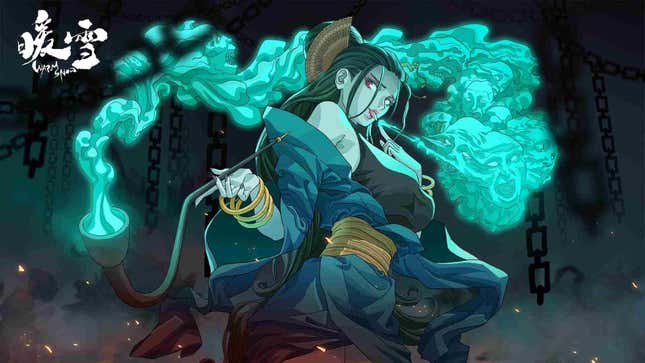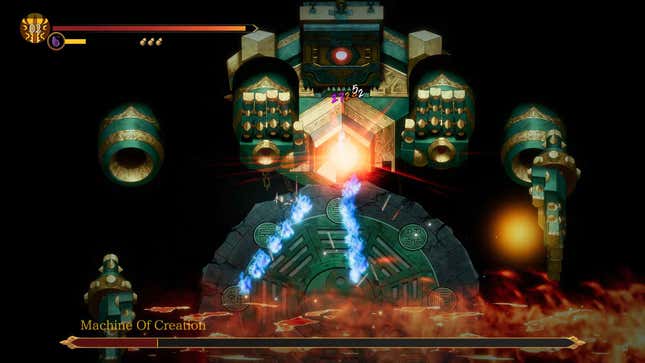
When roguelike games like Hades start you off with a sword, they usually just let you wield you one at a time. Not Warm Snow. This indie roguelike starts you off with not one, not two, but six whole swords. You can throw them at enemies with deadly precision, and then magically recall all of them at once in a storm of carnage. It’s a charmingly simple concept that feels incredibly badass in practice. If you’ve ever wanted to play a Chinese fantasy game with imagery that you don’t typically see in games inspired by medieval Europe or mythological Greece, then Warm Snow, available on Steam, is a great place to start.
Here’s the premise of Warm Snow: You play as Bi-an, a lone warrior who battles against the Five Great Clans. Each sub-area is tied to a specific theme (wolf, swine, crane, turtle, tiger, dragon) with a gruesome boss at the end. As in any good roguelike, you’ll pick up a variety of randomized skills and artifacts from every randomized room. Midpoint minibosses are randomized, but the grotesque final bosses aren’t. You’ll need reflexes, cunning, and resource management skills to reach the big bad: a Lovecraftian lotus flower that’s been turning everyone into zombies. It’s fine if you die during your attempt, and you will be doing so frequently. If you’ve defeated any bosses before being sent back to the starting temple, then you can spend the crystals you earn on persistent upgrades that make you more resilient on future runs. Power-ups also help soften the difficulty, but you can’t get out of learning enemy attack patterns.
Though Bi-an can opt for either melee or ranged modes of attack at the start of each run, it’s his flying sword ability that sets the game apart from other roguelikes. You can throw full-length swords at your enemies, and then magically recall them after a cooldown period. But wait, there’s more! You have six swords, and you can only recall them with magic, or by picking them up manually. So if you want to gun down–er, blade down?—a boss from afar, after depleting your arsenal, you have to run past their attack range to steal your swords back. Or else you’re going to have to zip around the room until your recall resets.
Safely sniping enemies from afar just didn’t feel that fun after my third run, though. I craved risk! Danger! Aggression! A chance to show off my virtuosic sword skills. After I ran out of ammo, I started running into crowds of enemies so that I could instantly impale them with my sword recall. I’m typically the type of roguelike player who likes to camp and snipe, but Warm Snow’s flying sword mode encouraged me to run headfirst into hordes. This was aided by an assortment of flashy powers that changed my playstyle considerably.
Instead of Hades’ Greek pantheon, here you have several Buddhist gods on your side. At the beginning of each run, you pray to one of six divine statues. Each offers special powers in either melee or ranged mode. If you choose melee mode, then you sacrifice the flexibility of flying swords for raw power. If you choose ranged mode, then you shoot projectiles that deal chip damage. The effects these gods bestow upon you can be devastating when combined with randomized dungeon pickups, but they’re also satisfying on their own.
If you choose the Infinite Arhat, for instance, then you’ll never run out of swords. If you choose the wine god, then your swords leave alcohol trails that can be set aflame. You start off rather fragile, and you will die a lot until you start figuring out your enemies’ attack patterns. But with enough skill upgrades, the final battles truly start to feel like you’re delivering divine retribution against corrupt mortal rulers. These skills are rated bronze, blue, and gold. Bronze skills are usually flat stat increases, blue ones slightly modify gameplay, and gold ones are high-risk and high-reward. For example, Damnation is a gold skill that quadruples your attack stat in exchange for reducing your defense by 300%. I died almost immediately when I first tried it out, and you bet I’m hoping to try it again.
The “relic” system in Warm Snow is functionally the same as Hades’ boons, but with a unique twist. Each relic can be slotted into a different function, and you can re-assign them at any time. A death lotus will reduce the amount of damage you take if placed into the Core slot, but will increase the damage your enemies take when used in the Power slot. Although having multiple of one type of relic is the most “optimal,” I enjoyed experimenting with new combinations. I really like this agency-driven approach over Hades’ system, which feels a lot more unforgiving about its RNG.

The game is considerably lighter on dialogue compared to Hades, but the environmental storytelling is chilling and evocative. While the titular Warm Snow refers to a virus that infects humans, I was also creating warm snow when I dashed across bodies, painting the snowy surface with bloody crimson blossoms as they exploded harmlessly in my wake. There are very few quips and no narration, but the incredible scenery and unique enemy designs help fill in the gaps. Warm Snow is for players who enjoy narrative ambiguity and piecing clues together from enemy drops. The bosses are supernatural, but their motivations aren’t. What you find here is a story about how ordinary people suffer when their rulers capitulate to greed.
However, the game is severely hampered by the quality of its localization. And it hurts me because the gameplay is otherwise so tightly designed. A lot of skill dialogue has unclear text and typos, which led me to experiment with abilities to figure out what they do instead of being able to rely on the explanations provided by the game. Sometimes, I would take a leap of faith on skills even if I wasn’t entirely sure how they would affect my gameplay. The English interface is also slightly messy. However, the most jarring part was the “Swine” level, which is filled with the corpses of naked women. The area’s boss also murders one in a sexualized context. It feels like a needlessly edgy way to convey evil in an otherwise elegant and polished game.
I recommend this game with one major caveat–make sure that you’re not playing this on a weekday because you just might ruin your sleep schedule as badly as I did. Playing this game at 4AM one recent night, I thought to myself, “Thank god I’m not going to work tomorrow.”